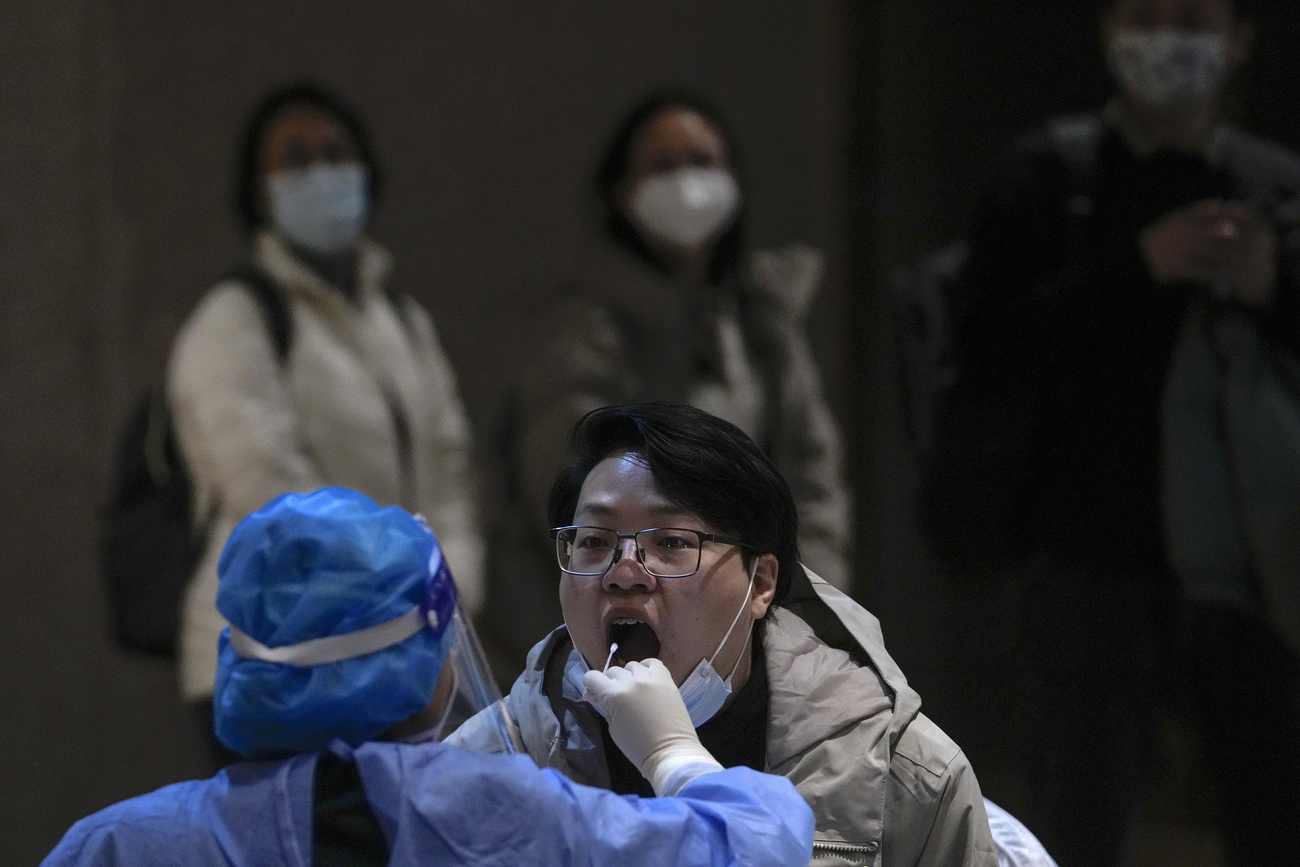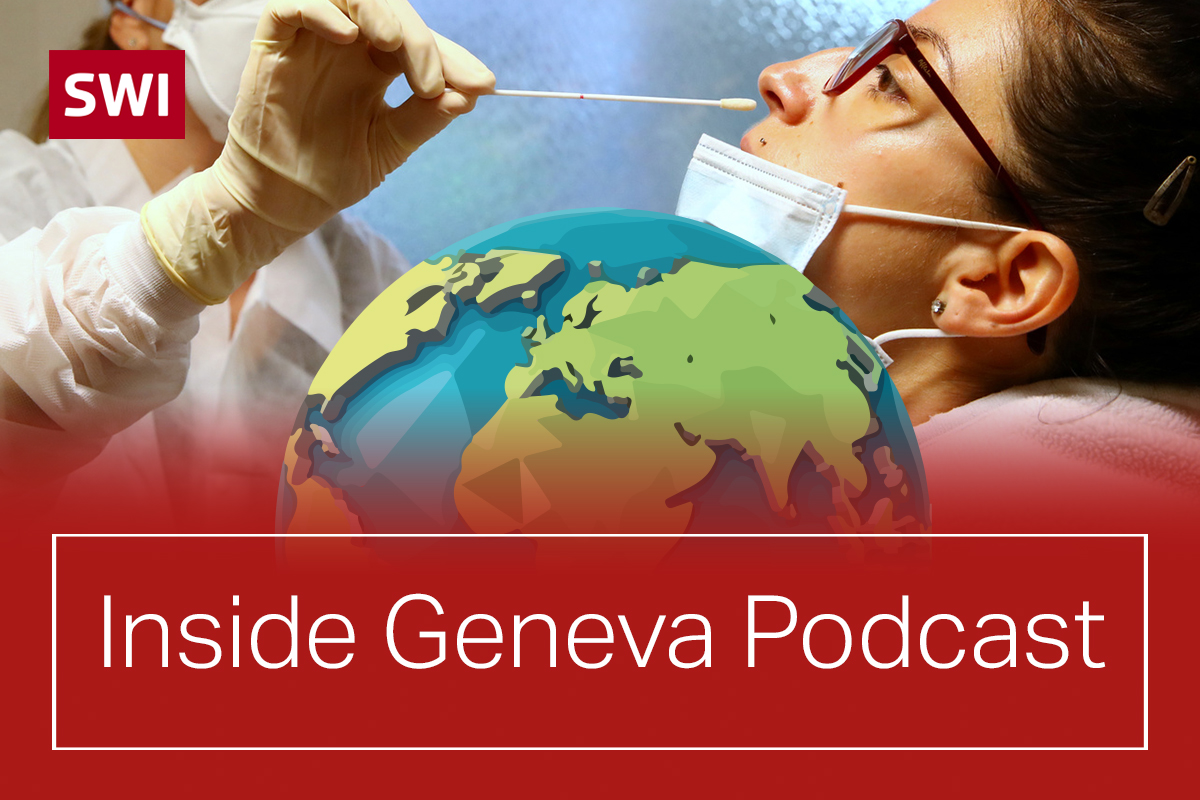Pandemic lessons – can we learn from them?
Readers in Geneva will have noticed that there are an awful lot of health experts in town. That’s right, it’s the World Health Assembly, the annual gathering of the WHO’s 194 member states.
It’s always a bit of a tricky task, reporting on the WHA. Like the World Economic Forum, there are more weighty discussions and panel debates than you can possibly attend…and yet many of them, important though they are (universal health coverage, polio eradication etc) are not exactly guaranteed to catch the news editor’s attention.
But this year, of course, the Covid-19 pandemic remains a key focus. Early in May, WHO director general Tedros Adhanom Ghebreyesus told us “it is with great hope that I declare Covid-19 over as a global health emergency.”
But before we get too euphoric, he also told us the pandemic is still very much with us. People continue to become infected, some are hospitalised, some die.
So on this week’s edition of our Inside Geneva podcast, I’ve been talking to WHA participants, to try to find out what we have learned in the last long, often miserable, three and a half years, and whether we are prepared to take concrete action to prevent something like this happening again.

More
How the World Health Organization is trying to learn lessons from Covid-19
More pandemics inevitable
Let’s be clear; we almost certainly can’t prevent another pandemic. As Dame Barbara Stocking, who chairs the Panel for a Global Public Health Convention, tells me on Inside Geneva: “We have no idea when the next one is going to come. It’s coming, absolutely no question about that, it could be tomorrow, it could be 3 years, it could be 10 years but it’s coming.”
Our task then is to shore up our defences, so that we don’t have to have endless lockdowns, school closures, abandoned holidays, and cancelled weddings. It is also to have effective test and trace systems in place, plans to protect the most vulnerable, and a global agreement to ensure treatments and vaccines are affordable and available to all.
All of these things could be in a pandemic treaty. WHO member states have set themselves an ambitious target of having a final draft of a treaty in just 12 months time.
How realistic is that? International treaties are notoriously difficult to negotiate, and tend to take years, not months, to finalise. But health experts are keen to ensure governments stay focused.
The WHO’s van Kerkhove, who many will remember for her regular press briefings during the darkest days of the pandemic, tells Inside Geneva: “I’ve been concerned about complacency since the first year of the pandemic… The world has moved on and that’s good, you know people living their lives. We don’t want people to be scared. But we don’t want governments to forget.”

More
Inside Geneva: what became of the pandemic treaty?
Tricky negotiations
It’s clear that, despite broad agreement that we really must cope better with the next pandemic, there will be disagreement about what’s needed to ensure that.
I wanted to get some member states on Inside Geneva, but the ones I approached were, shall we say, shy. With twelve months of haggling to go, they are not keen to reveal their positions.
But there are plenty of other people, from global health experts to pharmaceutical industry representatives, ready to offer their views on what a good pandemic treaty should look like.
Stocking of the Panel for a Global Public Health Convention sees fair access to vaccines and treatments as “the most difficult issue.” Developing countries who watched wealthy countries stockpile vast quantities of vaccines while they went without, are, Stocking believes, going to insist that equity is enshrined in a pandemic treaty. “I don’t think the developing countries will sign up to any treaty, when they don’t see that there are plans to get much nearer to equity.”
So what does equity mean? For some it means waivers on intellectual property rights – in the middle of a pandemic, the thinking goes, a lifesaving treatment or vaccine is a public good, not a profit generator for a private company.
Unsurprisingly, the pharmaceutical industry, which is involved in the treaty negotiations, will resist IP waivers. “Listening to some people,” Thomas Cueni, the head of the International Federation of Pharmaceutical Manufacturers (IFPMA) tells Inside Geneva. “You could be easily deceived and think that all these vaccines, tests and treatments fell from heaven. Not quite. Pretty much all of them were researched, developed and scaled up by private manufacturers.”
Nevertheless, Cueni does believe the industry is ready to commit to tiered pricing, and to making sure supplies are put aside immediately for health workers and the most vulnerable worldwide. “If you want to reach patients you need to offer your drugs, your treatments, at significantly lower prices in the low income countries.”
Sovereignty question
Another key question for a possible pandemic treaty relates to information sharing, and transparency. It’s not so long since a number of member states were criticising the WHO for not getting more information about the pandemic’s origins from China. There were suggestions that, rather than wait to be invited in by a country suffering a novel disease outbreak, the WHO should have the power to parachute in. A virus swat team if you like.
But now that governments are getting down to the negotiations, that proposal seems to have faded away. Some health experts say that’s because China’s biggest critics only want a virus swat team for China, and maybe Russia, but would not accept an uninvited WHO mission on their own territory.
Suerie Moon, co-director of the Global Health Centre at Geneva’s Graduate Institute points out that “Interestingly what we have not seen is any proposal from any government to really impinge on the sovereignty of any other government.”
It is totally normal for countries to query an international treaty that might affect their own national sovereignty, but, as Stocking tries to remind them, “We are all in this together; any one country could start another outbreak, and then we’re off to pandemics again.”
And Moon, who has long experience of dangerous disease outbreaks, and who knows better than most that another pandemic is inevitable, cannot hide her frustration.
“We don’t have a lot of time to spend on negotiating games, we have less than a year to get this done. So if we don’t see some rapid progress on some of the most difficult issues soon, we’re not going to make it. My worry is that we’ll get stuck in a political stalemate, and that nothing moves until another crisis hits.”
Is that what we want? To have to learn the same bitter lessons from a second pandemic, when we could have learned from the first? We’ll know more this time next year, but for now tune into Inside Geneva!

In compliance with the JTI standards
More: SWI swissinfo.ch certified by the Journalism Trust Initiative

You can find an overview of ongoing debates with our journalists here. Please join us!
If you want to start a conversation about a topic raised in this article or want to report factual errors, email us at english@swissinfo.ch.